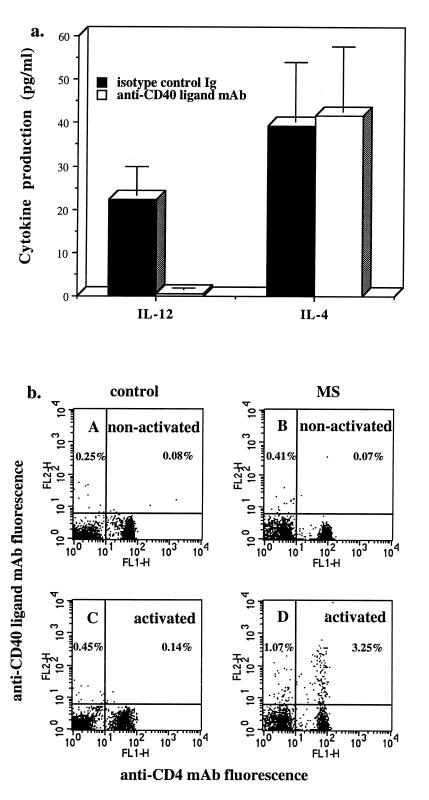Figure 3.
(a) Increased TcR-mediated IL-12 production in MS is mediated by activated T cells via CD40 ligand. T cells and APCs from chronic progressive MS patients were activated with immobilized anti-CD3 mAb as described in the legend for Fig. 2. Anti-CD40 ligand mAb (10 μg/ml, clone m92, mouse IgG2a, provided by W. Fanslow, Immunex) or isotype control mouse IgG2a (10 μg/ml; PharMingen) were added from the beginning of the cultures. The levels of biologically active IL-12p70, IL-4, and IFN-γ were measured in 24-h culture supernatants by ELISA in pg/ml. Data are mean ± SEM of seven different experiments with different MS patients. Production of IL-12 was significantly reduced in the presence of anti-CD40 ligand mAb (P = 0.007 vs. isotype control Ig). Production of IFN-γ was 1381 ± 302 pg/ml in cultures with control mouse IgG2a and 634 ± 188 pg/ml in cultures with anti-CD40 ligand mAb. (b) Increased CD40 ligand expression by activated T cells in progressive MS. T cells from a control subject (A and C) or chronic progressive MS subject (B and D) were cultured with immobilized mouse IgG2a (A and B) or immobilized anti-CD3 (C and D) for 20 h. T cells were then stained with FITC-conjugated mAb specific for CD4 (Coulter Immunology) and phycoerythrin-conjugated anti-CD40 ligand mAb (PharMingen), according to the manufacturer’s recommendations. Flow cytometric analysis of 5 × 103 cells from each sample was performed on an FACSort flow cytometer (Beckton Dickinson) according to standard procedures. Data are representative of six separate experiments. For all tested subjects, a significantly higher number of anti-CD3 activated T cells from progressive MS patients expressed CD40 ligand (2.5 ± 0.3%, n = 6) vs. controls (0.6 ± 0.2%, n = 8) or relapsing remitting MS patients (0.6 ± 0.24%, n = 6), P < 0.001, chronic progressive MS vs. control or relapsing–remitting MS. Less than 0.2% of anti-CD3-activated T cells from any tested donor were positively stained with combination of control FITC- and phycoerythrin-conjugated mouse IgG (all from Coulter Immunology).

